It’s that awkward moment when a state agency has to point out that you’re ripping off your customers. That’s the embarrassing situation Whole Foods Market Inc. found itself in when the New York City Department of Consumer Affairs announced it was investigating Whole Foods after finding that the company’s local stores routinely overstate the weight of its pre-packaged products.
Examples of the overcharging included a vegetable platter that was overpriced by $6.15; an average overcharge of $4.85 on a bag of chicken tenders; and a package of berries that were overpriced by $1.84. The most egregious was a $14.84 overcharge for a package of coconut shrimp.
“Our inspectors tell me this is the worst case of mislabeling they have seen in their careers, which DCA and New Yorkers will not tolerate,” said DCA Commissioner Julie Menin. “As a large chain grocery store, Whole Foods has the money and resources to ensure greater accuracy and to correct what appears to be a widespread problem—the city’s shoppers deserve to be correctly charged.”
Ouch. This is no longer just a company error; it’s an issue of brand trust. The scandal immediately put Whole Foods on defense, prompting its co-CEOs to release a video apologizing and setting forth three initiatives to fix the problem:
- Increase employee training.
- Implementing third-party auditing system.
- Giving items for free if they are incorrectly labeled.
It’s a good-intentioned plan that’s a little too late, considering the damage has already been done. Whole Foods’ sales growth slowed sharply last month following the allegations.
Self-Auditing Would Have Prevented This Problem
Whole Foods’ leaders chalked up the mistakes to their hands-on approach to making the food. In fairness, some of these mislabeling mistakes benefited the customers, and they lost money on certain transactions. Still, it begs the questions: Why not take a hands-on approach to checking your work?
Had Whole Foods had an employee-led, self-auditing system in place, these errors would have been identified before the public shaming. Surely, responsible employees would have noticed that the overcharging was prevalent among packages that had been labeled with exactly the same weight, considering it’s practically impossible for all the packages to weigh the same amount, as the DCA pointed out.
If enough of these issues were reported internally, surely it would have gotten the attention of a senior executive and led to a proactive—rather than reactive—response.
Considering this is not the first time Whole Foods has faced this issue, it may be time for some more drastic internal self-auditing measures. Whole Foods has an opportunity to do that with the opening of its new 365 Market by Whole Foods concept.
The pricing scandal may have lost some customers for good, but it’s not too late for Whole Foods to gain and keep the trust of new customers in new markets.
Subscribe to our blog
You are now subscribed!


